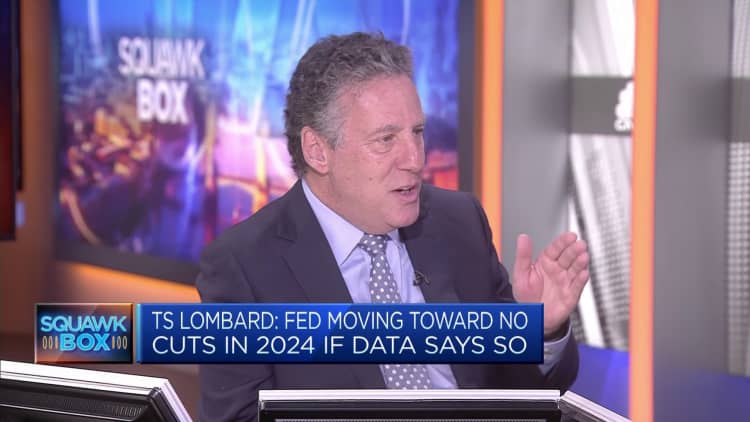Markets will continue to rally even if the Federal Reserve chooses not to cut interest rates this year, according to Steven Blitz, chief U.S. economist at TS Lombard.
His comments come as investors await the release of further U.S. economic data and closely monitor clues from Fed officials about the expected number of interest rate cuts in 2024.
Last week, the U.S. central bank left interest rates unchanged for the fifth consecutive time, in line with expectations, keeping its benchmark overnight borrowing rate in a range between 5.25%-5.5%. The Fed also said at the time that it still expects three quarter-percentage point cuts by the end of the year.
The message fueled a market rally in the U.S. and overseas, with benchmark indexes climbing to fresh record highs since.
Asked on Thursday about the likelihood of one or no Fed interest rate cuts this year, Blitz said that it's "getting pretty good. You know that 0.4% month over month is a high number, and you know they are looking at that. They're not just looking at year over year."
"Really what is going on here is an evolution, right?" Blitz told CNBC's "Squawk Box Europe" on Thursday.
"They [the Fed] have already told you they are not going to hike rates to try to shorten that timeline of getting to 2%, so if you're the market you're like, 'well that's OK,'" Blitz said.
"The key is … let the markets figure that out, rather than the Fed imposing that view. Let everybody evolve to that position slowly, and then all's OK."

Traders are currently pricing in a roughly 55% chance of a first Fed rate cut in June, according to the CME FedWatch Tool. That's down from nearly 70% last week.
Blitz said markets will likely continue to march higher, even if the Fed decides not to impose any interest rate cuts this year — a prospect that U.S. asset manager Vanguard named as their base-case scenario.
"It's a very big, diverse economy and it's a very big country. So, you never have all geographic regions and every industry in every corner of the country doing well. There are always leaders [and] laggards, it's just the nature of the beast, right?" Blitz said.
"The equity investor's job is to pick out what's doing better, you know, where the value is but as an economist stepping back, you say no there is no reason for the equity market to go down."
A narrow window for a rate cut?
Fed Governor Christopher Waller on Wednesday said that there was "no rush" to cut the U.S central bank's policy rate to normalize policy.
Speaking at an Economic Club of New York gathering, Waller cited recent inflation data, which "tells me that it is prudent to hold this rate at its current restrictive stance perhaps for longer than previously thought to help keep inflation on a sustainable trajectory toward 2 percent."
Separately, Atlanta Federal Reserve bank President Raphael Bostic last week said that he now expects just one single quarter-point rate cut this year, down from the two cuts that he had previously projected.
"I think Bostic is an important voice, but I think Waller is much more important. I think he is sort of considered a bit of the alter-ego of [Fed Chair Jerome] Powell so when he says something the markets should react to it," Blitz said.
"To be fair to the Fed, which I don't have to be, but to be fair to the Fed they are kind of evolving, and they are doing the right thing by not rushing in either direction."
Blitz said the Fed will be prepared to cut rates if the world's largest economy falls apart after June, but warned that the optics of such a move could become "very difficult" in the second half of the year, citing the upcoming presidential election in November.
"If they do cut, it's because inflation is lower and they don't want to passively get more restrictive," Blitz said.
"If you think about it in terms of the politics of it, which we can't avoid this year in the U.S., if they cut rates simply because inflation is lower but the economy is still doing well, the optics of that is that he's part of the committee to re-elect [President Joe] Biden, right? So, even though we all understand the reason why they are cutting because inflation is at 3% rather than 4%, etcetera."
Asked whether that may be one reason why the Fed won't be able to wait too long to cut rates, Blitz replied, "Exactly. And that's why the market is sitting there with a two-thirds probability of a cut in June because this kind of cut they can only do by June, and after June the window to do that is shut."


